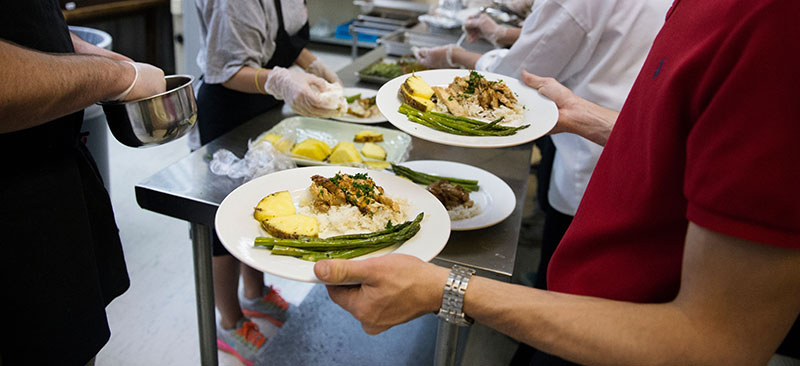
Culinology®
The Culinology® degree program integrates Food Science and Culinary Arts so that students are prepared to work in diverse areas within the food industries—from experimental research chefs and menu planners to food manufacturing, fine dining, and product development. Culinology® is an approach to food that blends culinary arts and food technology. Through the blending of these two disciplines, culinology® seeks to make food taste better—whether purchased in a supermarket or eaten in a restaurant. Culinology® also seeks to make food more consistent and safer. A primary application of culinology® is to logically translate sophisticated food concepts, such as those applied in fine dining or in a traditional ethnic cuisine, to items that are on the menus of chain restaurants or those processed for retail sale. Such chain-menu or retail product development is only possible through the astute combination of culinary arts and food science and technology.
Occupational Outlook Handbook: The median annual wage for chefs and head cooks was $45,950 in May 2017. Employment of chefs and head cooks is projected to grow 10 percent from 2016 to 2026, faster than the average for all occupations. Most job opportunities for chefs and head cooks are expected to be in food services, including restaurants.
Curriculum
Careers
This program trains students to be successful in the food industry in the areas of processing and business in the following careers:
- Chefs and Head Cooks
- Food Scientists and Technologists
- Food Service Managers
- Food Manufacturing Operations Manager
- Ingredient Sales or Purchasing
- Marketing
- Product Development
- Quality Assurance
- Quality Control Technician
- Research Chef
Food Science Minor
A minor in food science is available. Students complete 18 hours of courses in Applied Food Chemistry, Composition and Chemical Reactions of Foods, Microbiology of Foods, Food Preservation Technology, plus other courses from which students can choose.
Meat Science Certificate
The Department of Food Science, Nutrition and Health Promotion and the Department of Animal and Dairy Sciences offer a Meat Science Certificate for students who wish to specialize in the meat processing industry. The 24 credit hour curriculum equips students to be career-ready professionals with a comprehensive understanding of the industry and a skill-set designed for them to make an immediate impact in meat science government, academic, or industry positions upon graduation. View the Undergraduate Catalog for courses.
Transfer Guide
Students may transfer to Mississippi State University from regionally accredited community, junior or senior colleges for any period of enrollment, provided they have earned a 2.0 GPA (as computed by Mississippi State University) on all college courses attempted as well as earned a 2.0 GPA on the 30-hours of core courses. Transfer students should look at the transfer course equivalent guide to determine which courses will transfer.
Internships
Internships and/or professional experience prepares students for future careers in Food Science. A significant percentage of employers prefer students with work experience outside of a college environment to students with no experience, according to new data released by the Chronicle of Higher Education. Students should check with the MSU Career Center or the program coordinator for internship opportunities.
Graduate Studies
A student may work toward a Master of Science in Food Science, Nutrition and Health Promotion with a concentration in Food Science and Technology by selecting courses from Food Science, Nutrition and Health Promotion and allied areas such as biochemistry, microbiology, animal and dairy sciences, and other disciplines. Faculty, staff members, and facilities of the cooperating departments are utilized. A Bachelor of Science in Food Technology, Food Science, or related areas will be considered to meet the prerequisites for study toward an advanced degree. Students from other disciplines may be required to take leveling courses generally not to exceed 15 semester hours. Learn More
Scholarships
Students may apply for university, college and departmental scholarships through one application. You can find the scholarship application once you login to myState. Under the banner tab, select Financial Aid and Scholarships. The application is listed as Submit/Revise General Scholarship Application.
Organizations
The Department of Food Science, Nutrition and Health Promotion encourages its students to take advantage of the many experiences offered by the departmental student organizations and teams. Clubs are a great way to develop leadership skills and to learn about the various food industries. Visit the organizations page to find out more.
Quick Links:
- Academic Calendar
- Apply Online
- Courses
- Explore our Facilities
- Financial Aid
- Find a Major
- Graduate Bulletin
- Locate Us
- Schedule a Visit
- Student Housing
- Student Organizations
- Undergraduate Bulletin
